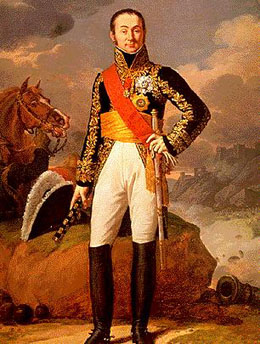| Nicolas-Charles Oudinot  Born: 25-Apr-1767 Born: 25-Apr-1767
Birthplace: Bar-le-Duc, France
Died: 13-Sep-1847
Location of death: Paris, France
Cause of death: unspecified
Remains: Buried, Les Invalides, Paris, France
Gender: Male
Race or Ethnicity: White
Sexual orientation: Straight
Occupation: Military Nationality: France
Executive summary: Napoleonic General Nicolas-Charles Oudinit, Duke of Reggio, Marshal of France, came of a bourgeois family in Lorraine, and was born at Bar-le-Duc on the 25th of April 1767. He had a passion for a military career, and served in the regiment of Médoc from 1784 to 1787, when, having no hope of promotion on account of his non-noble birth, he retired with the rank of sergeant. The Revolution changed his fortunes, and in 1792, on the outbreak of war, he was elected lieutenant-colonel of the 3rd battalion of the volunteers of the Meuse. His gallant defense of the little fort of Bitsch in the Vosges in 1792 drew attention to him; he was transferred to the regular army in November 1793, and after serving in numerous actions on the Belgian frontier he was promoted general of brigade in June 1794 for his conduct at the battle of Kaiserslautern. He continued to serve with the greatest distinction on the German frontier under Hoche, Pichegru and Moreau, and was repeatedly wounded and once (in 1795) made prisoner. He was André Masséna's right hand all through the great Swiss campaign of 1799 -- first as a general of division, to which grade he was promoted in April, and then as chief of the staff -- and won extraordinary distinction at the battle of Zürich. He was present under Masséna at the defense of Genoa, and so distinguished himself at the combat of Monzambano that Napoleon presented him with a sword of honor. He was made inspector-general of infantry, and, on the establishment of the empire, given the Grand Cross of the Legion of Honor, but was not included in the first creation of marshals. He was at this time elected a member of the chamber of deputies, but he had little time to devote to politics. He took a conspicuous part in the war of 1805 in command of the famous division of the "grenadiers Oudinot", formed of picked troops and organized by him, with which he seized the Vienna bridges, received a wound at Hollabrünn, and delivered the decisive blow at Austerlitz. In 1806 he won the battle of Ostrolenka, and fought with resolution and success at Friedland. In 1808 he was made governor of Erfurt and count of the Empire, and in 1809, after displaying brilliant courage at Wagram, he was promoted to the rank of marshal. He was made duke of Reggio, and received a large money grant in April 1810. Oudinot administered the government of Holland from 1810 to 1812, and commanded the II corps of the Grande Armée in the Russian campaign. He was present at Lützen and Bautzen, and when holding the independent command of the corps directed to take Berlin was defeated at Gross Beeren. He was then superseded by Michel Ney, but the mischief was too great to be repaired, and Ney was defeated at Dennewitz. Oudinot was not disgraced, however, holding important commands at Leipzig and in the campaign of 1814. On the abdication of Napoleon he rallied to the new government, and was made a peer by Louis XVIII, and, unlike many of his old comrades, he did not desert to his old master in 1815. His last active service was in the French invasion of Spain in 1823, in which he commanded a corps and was for a time governor of Madrid. He died as governor of the Invalides on the 13th of September 1847. Oudinot was not, and made no pretence of being, a great commander, but he was a great general of division. He was the beau-ideal of an infantry general, energetic, thoroughly conversant with detail, and in battle as resolute and skilful as any of the marshals of Napoleon.
Father: Nicolas Oudinot
Mother: Marie Anne Adam
Wife: Charlotte Derlin (d. 1810, six children)
Son: Charles Nicolas Victor, 2nd Duke of Reggio (Lt. General, b. 1791, d. 1863)
Shot: Battle (8-Aug-1794)
Shot: Battle Siege of Mannheim (1795)
Shot: Battle (14-Sep-1796)
Shot: Battle (14-Aug-1799)
Shot: Battle (13-Nov-1805)
Shot: Battle (21-May-1809)
Shot: Battle (6-Jul-1809)
Shot: Battle (Aug-1812)
Shot: Battle (28-Nov-1812)
Do you know something we don't?
Submit a correction or make a comment about this profile
Copyright ©2019 Soylent Communications
|